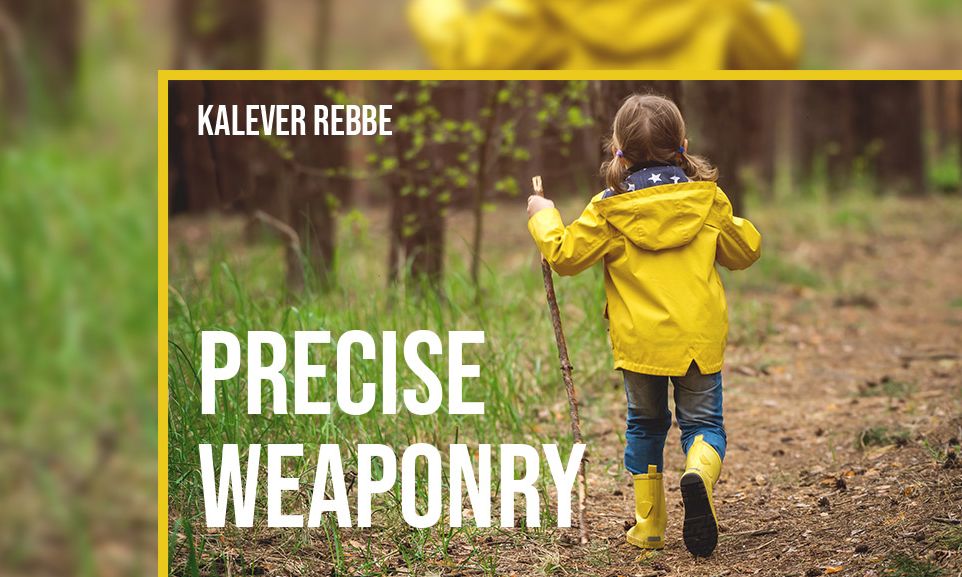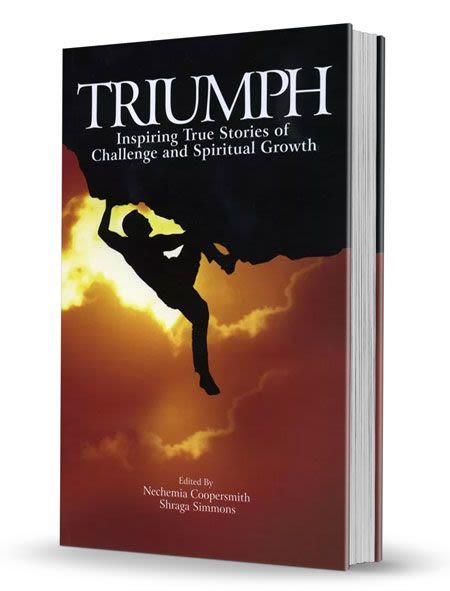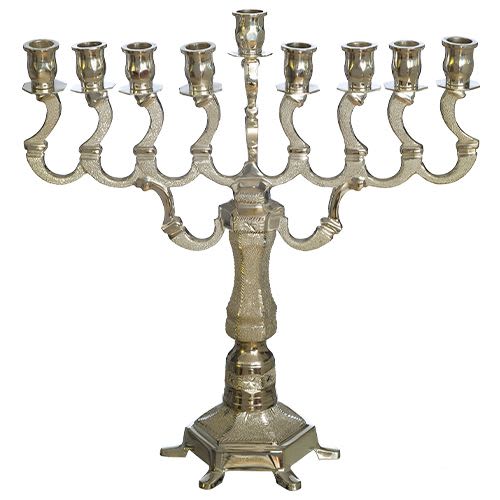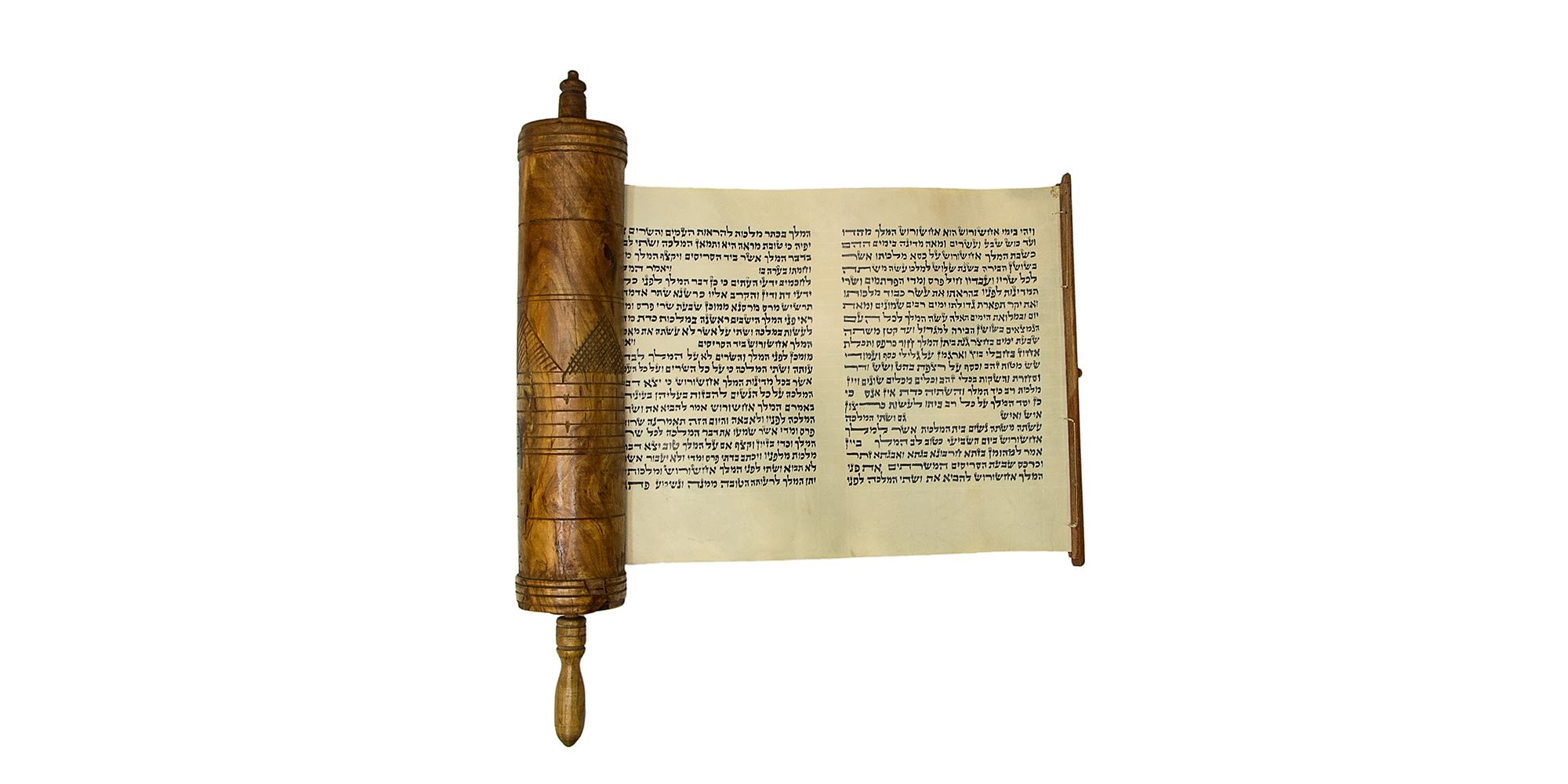
Precise Weaponry
He's just a child...what do you want from him? Without a proper Jewish education, a child will develop bad habits and lack boundaries, which the child will never "outgrow".

“A war for the Lord against Amalek from generation to generation”. (Shemot 17:16)
A Bucket, A Child
On Rosh Chodesh Shevat, 5714, the Vishnitzer Rebbe, zt”l, visited the United States. I went to participate in the Rebbe’s Tish at his Beit Midrash in Williamsburg, NY. During his remarks, I heard the Rebbe say: “The letters for the mazal of the month of Shevat, which is דלי-bucket, are the same letters as ילד-child“.
We can understand the hint of Rebbe’s teaching, in a way that is extremely relevant to Jewish education in our society.
Never Too Early
There are educators and parents who mistakenly believe that you do not have to begin educating boys and girls while they are young. They think that you can wait until they are older. They say: “Who cares if the child doesn’t behave properly? They are still toddlers! They are children! They will choose what is best for their lives when they are older. Now, we do not have to place so many restrictions and rules on them.”
This approach to educating children is extremely distorted. A Jewish education must begin from the moment a child is born. For, the Yetzer Harah begins battling its spiritual war immediately by trying to capture and control that child’s soul. As the pasuk says (Bereishit 8:21), “for the imagination of man’s heart is evil from his youth”.
If parents do not teach their children to combat the Yetzer Harah, and they do not teach them the proper tools and skills how to avoid bad behaviors, the children will develop horrible habits and they will lack boundaries. They won’t grow out of these habits, but they will become more ingrained on their character with time and repetition.
Remain on Target
This is analogous to an archer whose success depends on his accuracy. If he deviates even the slightest, the arrow will not only miss its target but the further that the arrow travels the greater that divergence will become. Precision at the start is key.
We see nowadays how countries go to great lengths to develop more precise weaponry. Their success in battle depends on it.
Dovid HaMelech compares educating children to the precision of an archer, when he wrote in Tehillim (127:4), “Like arrows in the hand of a mighty man, so are the sons of one’s youth”. Like an arrow, if a child veers even slightly from the righteous path, as time goes on, that child will become increasingly distant from the target, the desired outcome.
Education is a Serious Responsibility
Ignoring and neglecting a child’s Jewish education because they are still young, is a grave and serious matter. Chazal (Bamidbar Rabba 4:20) relates that there was once a man whose son would speak disgustingly during davening in Shul (synagogue). When someone approached this man about his son’s behavior, he said, “What do you want me to do? He is a child! He is going to play around!” The father did nothing and suffered terrible punishments from the Heavens. Similarly, the Midrash (Kohelet Rabba 3:3) taught that a man’s home collapsed as a punishment for not preventing his sons from sinning and using the excuse, “They are small children.”
Parents must go out to wage the war against the Yetzer Harah and protect their children by training them to do good, holy behaviors from a young age. Psychologists have confirmed what we have known from the tradition of our ancestors and tzaddikim – that a child’s earliest memories make an impression that impacts them for the remainder of their lives.
Early Impressions Last a Lifetime
During the mitzvah of “Hakheil” (gathering of the entire nation) the yidden were commanded to bring even the young children to the Beit HaMikdash to hear Sefer Devarim read, even though they could not possibly understand the words. Nevertheless, they had to be brought because hearing the Torah read would make an everlasting impression. This would help educate them, and the parents were rewarded (Chagigah 3a).
The Yerushalmi (Yuvamot 1:6) relates that R’ Yeshuah ben Chaninah’s mother use to take him in his crib to the Beit Midrash so that he would hear the men studying Torah. And the sages said of him, “Joyful is the one who born him!”
I once heard someone relating to my father the Rebbe, zt”l, that when he was seven years old, my grandfather the Eit Ratzyon zt”l spent Shabbat in his town. On Shabbat morning, during davening, he heard the Tzaddik scream, “Living Creator of the entire world – All praise You!” And he continued davening with tremendous passion and enthusiasm. Even though he was a young child, this made such an impression on him, it imprinted an incredible feeling for holiness, that it lasted his entire life.
Rosh Hashanah for Trees
We eat fruits on Tu B’Shvat, the Rosh Hashanah for Trees. This is a time when we undergo the work of preparing the trees that will bear fruit, and we need to remember that a man is compared to a tree, as it says (Devarim 20:19) “the man is a tree of the field”.
A tree must be carefully cared for and supported so that as it grows taller, wider, and stronger, it remains straight. Once the tree is grown, it can no longer be corrected. A tree needs to be cared for diligently so that it can produce beautiful fruits.
So too, we need to care for our children’s education while they are still young, when they are growing and developing, so that when they are older, they will remain on the straight and just path and live a life of Torah, mitzvot, and good deeds. We need to protect them from bad influence, and help them forge friendships with good children.
This is the meaning of what I had heard from the Vishnitzer Rebbe: the mazal of the month of Shvat is דלי-bucket, which are the same letters as ילד-child. This is a time when we need to remember to help our children to come out from the lustful “waters” of the Yetzer Harah like we remove a bucket from the water of a well.
This idea is alluded to in our pasuk. We need to “Wage a war for the Lord against Amalek”, the Yetzer Harah, continuously “from generation to generation”. This effort applies to the younger generation, the children, and the older generation equally.
***
The Kalever Rebbe is the seventh Rebbe of the Kaalov Chasidic dynasty, begun by his ancestor who was born to his previously childless parents after receiving a blessing from the Baal Shem Tov zy”a, and later learned under the Maggid of Mezeritch zt”l. The Rebbe has been involved in outreach for more than 30 years, and writes weekly emails on understanding current issues through the Torah. You can sign up at www.kaalov.org.










Tell us what you think!
Thank you for your comment!
It will be published after approval by the Editor.